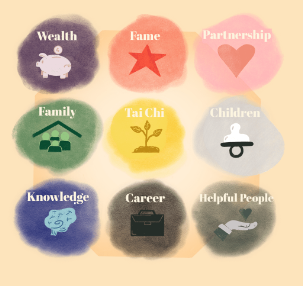
Feng Shui, an ancient
Chinese practice, is centered on harmonizing individuals with their
environment. Rooted in Taoist philosophy, Feng Shui (meaning "wind and
water") seeks to balance the energies within a space, enhancing health,
prosperity, and overall well-being. The essence of Feng Shui lies in three core
concepts: Qi (energy), Yin and Yang (balance), and the Five Elements (Wood,
Fire, Earth, Metal, and Water). These elements are strategically utilized to
create a harmonious Feng Shui home, whether in your Feng Shui
bedroom, Feng Shui living room, or entire Feng Shui house.
Incorporating Feng Shui
into your home, garden, or business can transform these spaces into sanctuaries
of positive energy. For instance, a Feng Shui bedroom should be
arranged to promote restful sleep and rejuvenation, while a Feng Shui living
room should encourage social harmony and comfort. An ideal Feng Shui
house is one that allows energy to flow smoothly, enhancing the well-being
of its occupants.
Feng Shui is equally beneficial in business settings, where aligning office spaces with Feng Shui principles can create a productive and prosperous environment. By considering the orientation of buildings and the placement of rooms, Feng Shui enhances the overall quality of life, much like the goals of the Environmental Protection Agency (EPA) in promoting healthy and balanced environments.
Feng Shui design is
grounded in four fundamental principles:
The five elements
in Feng Shui—Wood, Fire, Earth, Metal, and Water—are interconnected forces
that work together to create balance. When practicing Feng Shui at
home, the goal is to harmonize these elements to enhance specific areas of your
life.
Start by identifying one
to three areas you want to improve using the Bagua map. Strengthen the energy
in these areas by incorporating colors, shapes, and items related to the
elements. For example, if your Bagua map shows that your Feng Shui bedroom is
connected to overall wellness, which aligns with the Earth element, use earth
tones and decorate with items like ceramic pots, stones, or crystals to enhance
the energy.
As you make these changes,
move on to other rooms or aspects of your life, such as applying Feng Shui
principles in your Feng Shui living room or office. The
objective is to bring positive energy into each space, improving your life and
creating harmony throughout your Feng Shui home.
By integrating these
elements into your living or working space, you can enhance specific aspects of
your life. For instance, adding a water feature in the right location can boost
career prospects, while incorporating wood elements can promote personal growth.
Feng Shui extends
beyond architecture and natural elements to include the arrangement of
furniture, color schemes, and symbolism. In an office setting,
applying Feng Shui principles to your office layout is essential for
creating a productive environment. For example, your desk should be placed in a
commanding position—ideally facing the door but not directly in line with it.
This placement allows you to see opportunities as they come while shielding you
from negative energies.
Colors also play a
significant role in Feng Shui. Each color is associated with one of
the Five Elements and can influence the mood and energy of a space.
For example, red (Fire) can boost energy levels, while blue (Water) can create
a calming atmosphere.
Symbolism is crucial
in Feng Shui. Certain symbols, such as dragons, fish, and plants, can
attract positive energy and ward off negativity. Placing these symbols in your
fortunate sectors and directions can enhance various aspects of your life, such
as wealth, health, and relationships.
Flying Star Feng
Shui is an advanced and complex school of Feng Shui that focuses
on the movement and interaction of energies over time. Based on the Early
Heaven Ba Gua, Flying Star Feng Shui involves annual shifts in energy
patterns, which can significantly influence the flow of energy in your space.
Understanding these shifts
allows you to adjust your living or working environment to optimize energy
flow. In Flying Star Feng Shui, the productive cycle of the elements plays
a significant role, as elements either support or control each other, creating
harmony or disharmony in a space.
Yin and Yang are
fundamental concepts in Feng Shui, representing the duality of life. Yin
is associated with darkness, stillness, and femininity, while Yang is linked to
light, movement, and masculinity. Balancing these forces is crucial for maintaining
harmony in your Feng Shui home.
The interplay of Yin and
Yang influences both the energy on the land and personal energy patterns.
Positive and negative house energies can impact your well-being, and Feng
Shui remedies—such as adjusting furniture placement or using specific colors—can
restore balance. The productive cycle of the elements is also applied to
enhance Yin and Yang in a space.
Ching Divination, or I
Ching, is an ancient Chinese method of divination used to gain insight into
future events or decisions. It involves interpreting hexagrams, which are
symbolic representations of different life situations.
Each hexagram represents a specific phase in a process or situation. For instance, Meng (childhood) symbolizes growth and learning, while Tong Ren (seeking harmony) indicates cooperation and community. By applying Ching Divination principles, you can align your actions with the natural flow of energy, leading to more favorable outcomes in your personal and professional life.
Feng Shui is a
powerful tool that can enhance various aspects of life by creating a harmonious
environment. Whether through the placement of furniture, the use of colors, or
understanding the flow of energy, Feng Shui offers practical ways to improve
well-being, prosperity, and balance. By incorporating Feng Shui
basics and Feng Shui principles into your daily life, you can
create spaces that support your goals and enhance your quality of life. For
those interested in delving deeper, Feng Shui courses online and Feng
Shui training classes are available to guide you in mastering
this ancient art.